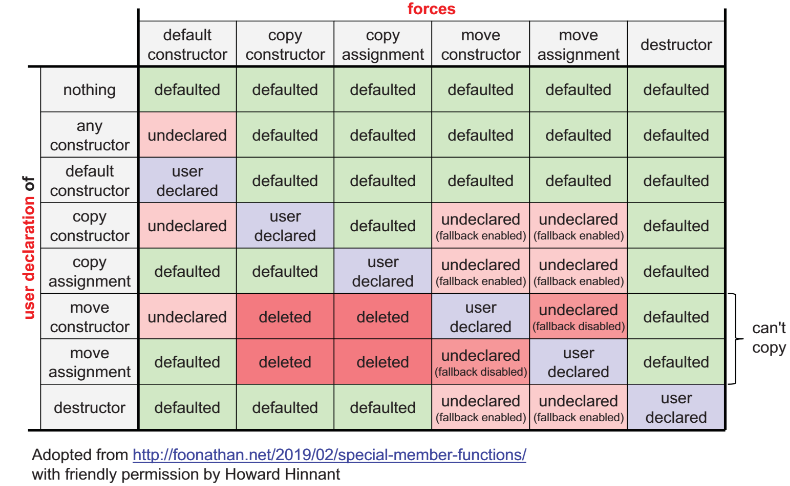Back to Basics: Move Semantics - Nicolai Josuttis - CppCon 2021
C++11 圣经之二 —— 移动语义。
我感觉大多数人不懂移动语义。
动机
首先来看当年的拷贝语义(C++98/03 年代)
1
2
3
4
5
6
7
| std::vector<std::string> coll;
coll.reserve(3);
// 假设返回的是一个很长的 string
std::string s{getData()};
coll.push_back(s);
coll.push_back(getData());
|

在以前的 C++,getData() 会返回一个临时对象,然后再被拷贝过去,然后再自己销毁。这显然没有什么意义,
在 C++ 11 之后,支持移动语义,那么编译器就不会再拷贝这个临时对象了,它只会 move 这个对象,类似于某些语言的浅拷贝。
很正常,因为我们也不会使用这个临时对象。
之后调用析构函数,不过它并不会释放任何内存,因为已经被移动走了,只是单纯的销毁临时对象。

这里告诉我们,可以尽量使用不具有名字的对象。(亡值)
std::move
但显然,大部分时候对象都是具有名字的,不然会非常不方便管理。
1
2
3
| std::string str{getData()};
coll1.push_back(str); // copy, 之后仍然需要 str
coll2.push_back(str); // copy, 之后不需要 str
|
如果对象有名字(左值),那么会默认拷贝。
当你需要处理参数时:
1
2
3
4
| void reinit(std::string& s) {
history.push_back(s); // copy, 但你不需要 str 了
s = getDefaultValue();
}
|
为了处理这些情况,我们有了函数 std::move
**std::move:我不再会需要这些值了。**move,并不 move,move 在语义上表示的是,你不再需要某些变量存在了。
1
2
3
| std::string str{getData()};
coll1.push_back(str); // copy, 之后仍然需要 str
coll2.push_back(std::move(str)); // move, 之后不需要 str
|
那么回到之前的例子,有一个有趣的问题。
1
2
3
4
5
6
7
| std::vector<std::string> coll;
coll.reserve(3);
// 假设返回的是一个很长的 string
std::string s{getData()};
coll.push_back(s);
coll.push_back(std::move(s)); // move
|
move 后 s 的状态是什么?

C++ 标准保证,对于 标准库 组件,move 后其处于 valid but unspecified 状态。具体能否使用要依赖实现。
1
2
| std::cout << s; // ok, some value
int i = s.size() // ok, 但你不知道 i 是什么
|
你可以 reuse move 后的对象
1
2
3
4
5
| std::vector<std::string> allRows;
std::string row;
while (std::getline(myStream, row)) {
allRows.push_back(std::move(row));
}
|
右值引用
在 C++03:
容器全部都是值语义
在 C++11 后:
使用右值引用你可以选择移动语义
右值引用绑定给右值:
- caller 不再需要 value
- 可能会 steal (代表 no const)但仍 valid
移动语义通常使用以下实现:
移动构造(优化拷贝)
移动赋值运算符(优化拷贝)
steal 原来的对象,但仍然保持其 valid
引用的重载
1
| void foo(const T&); // 只读
|
- 只能绑定 non-const 左值引用对象
- 可以更改对象
- 传入一个你不再会使用的值
- 使用 std::move() 或者 临时对象
1
| void foo(const T&&) // 语义冲突,不明觉厉
|
类的移动语义
基本的移动支持
标准库保证:除非有其他的指明,否则默认的 moved-from 对象之后应该是 valid but unspecified 状态。
如果没有提供移动支持,那么会使用 copy 作为 fallback,当然你也可以选择 disable 这个。通常 move-only 类型是这么干的,比如 std::thread, std::unique_ptr
默认的移动语义支持:自动生成移动构造、移动赋值运算符,除非
- 没有用户声明的复制构造函数
- 没有用户声明的复制赋值运算符
- 没有用户声明的析构函数

注意,用户声明包括 =default 这种,用户提供不包括。此外,=default =delete 都是函数定义。
此外,注意写 noexcept,vector 这样的容器在 resize 扩容时会使用 std::move_if_noexcept,来决定是调用移动还是拷贝构造。
多态类型中的移动
声明虚析构函数会抑制移动的生成。
完美转发
考虑以下情况,
1
2
3
4
5
6
7
8
9
10
11
12
| class C {...};
void foo(const C&);
void foo(C&);
void foo(C&&);
C v;
const C c;
foo(v); //-> foo(C&)
foo(c); //-> foo(const C&)
foo(C{}); //-> foo(C&&)
foo(std::move(v)) //-> foo(C&&)
|
完美,没有问题。
那么假设我们需要一个中间层来调用 foo,
1
2
3
4
5
6
7
8
9
10
11
12
13
14
15
16
17
18
19
20
21
22
| class C {...};
void foo(const C&);
void foo(C&);
void foo(C&&);
void callFoo(const C& x) {
foo(x); //-> foo(const C&)
}
void callFoo(C& x) {
foo(x); //-> foo(C&)
}
void callFoo(C&& x) {
foo(std::move(x)); //-> foo(C&&)
}
C v;
const C c;
callFoo(v); //->foo(C&)
callFoo(c); //->foo(const C&)
callFoo(C{}); //->foo(C&&)
callFoo(std::move(v)) //foo(C&&)
|
我们自然不想写三个重载,可以使用模板,那样就需要使用完美转发。
想使用模板转发,那么你需要:
- 模板参数
- 模板形参声明为 &&
1
2
3
4
| template<typename T>
void callFoo(T&& arg) {
foo(std::forward<T>(arg));
}
|
arg 称为 universal (or forwarding) reference
emplace 中的完美转发
1
2
3
4
5
6
7
8
9
10
11
12
13
14
15
16
17
18
19
20
21
22
23
24
25
26
27
| template<typename T, ...>
class vector {
public:
...
template<typename... Args>
void emplace_back(Args&&... args) {
place_element_in_memory( T(std::forward<Args>(args)...) );
}
};
class Cust {
private:
std::string first;
std::string last;
int val;
public:
Cust(...)...{}
}
std::string first{"Jil"};
std::string last{"Cook"};
std::vector<Cust> cv;
cv.emplace_back(std::move(first), last, 39);
// 不需要 first,直接移动
// last 拷贝
// 39 拷贝
|
完美转发返回值
如果你想对返回值使用完美转发,那么
1
2
3
4
5
6
7
8
| // 直接使用
process(compute(t));
// 或者如果你需要使用参数的话:
auto&& val = compute(t);
...;
process(std::forward<decltype(val)>(val));
|
万能引用可以存储一切,包括引用性和常量性。
ranges 和完美转发
const views 可能不支持迭代,因为迭代中他们可能修改自身的状态。这时你需要万能引用
1
2
3
4
5
6
7
8
9
10
11
12
13
| template<typename T>
void print(const T& coll) { // 将其改为 T&& 即可
for (const auto& elem : coll) {
std::cout << elem << '\n';
}
}
std::vector vec{1, 2, 3, 4, 5};
print(vec); // ok
print(vec | std::views::drop(3)); // ok
print(vec | std::views::filter(...)); // bad
std::list lst{1, 2, 3, 4, 5};
print(lst | std::views::drop(3)); // bad
|




